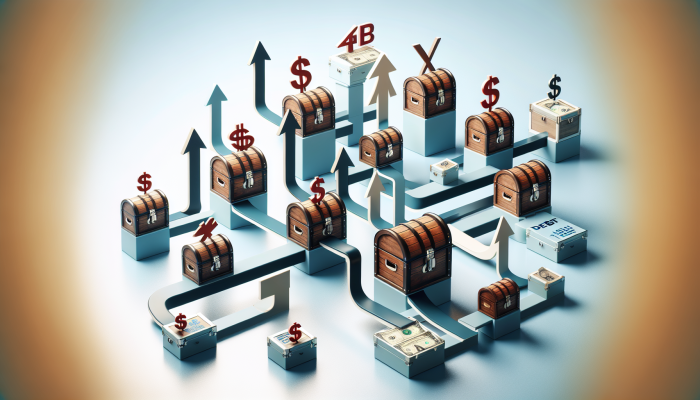Unlocking the Essential Advantages of Debt Consolidation: Critical Insights You Need
Exploring Debt Consolidation: An In-Depth Analysis

Debt consolidation represents a strategic financial maneuver that amalgamates multiple existing debts into a singular loan, thus simplifying the repayment process for borrowers. This approach is particularly advantageous for individuals grappling with multiple credit card debts, personal loans, or assorted forms of debt. By opting for consolidation, you may secure a lower interest rate, which can translate into significant savings over time. The primary goal of Debt consolidation is to streamline your financial commitments—envision transforming a multitude of due dates into one straightforward monthly payment. Nonetheless, the efficacy of this strategy is contingent upon your unique financial landscape and the specific conditions tied to the new loan.
For many, the allure of debt consolidation stems from its capacity to offer a more organized framework for handling financial obligations. It has the potential to mitigate the stress that often accompanies the challenge of managing several payment deadlines. However, it is imperative to gain a deeper understanding of how this method functions to determine whether it genuinely aligns with your financial objectives and aspirations.
While debt consolidation can lead to reduced monthly payments and lower interest rates, it is not an all-encompassing remedy. Individuals with less-than-perfect credit scores may find it challenging to procure favorable loan terms, and in some instances, the new loan might incur fees that could negate any anticipated savings. Therefore, a meticulous assessment of your financial situation is essential before embarking on any consolidation strategies.
Dispelling Common Misconceptions About Debt Consolidation: What You Should Know
The domain of debt management is rife with misunderstandings, particularly regarding debt consolidation. A prevalent myth suggests that it acts as a quick-fix solution for all financial challenges. In reality, while it can alleviate some financial burdens, it does not erase debt entirely. Many individuals mistakenly believe that consolidating their debts will dramatically lessen their overall financial obligations, but this is often not the case.
Another widespread fallacy is that debt consolidation equates to fraud or serves as a gateway to predatory lending practices. Although unscrupulous lenders do exist, numerous reputable financial institutions provide legitimate consolidation options. It is crucial to conduct thorough research and select a lender with a strong reputation for integrity and reliability.
Moreover, some people operate under the assumption that debt consolidation will instantly enhance their credit scores. The impact on your credit score can vary. Initially, applying for a new loan may result in a slight dip in your score because of the hard inquiry; however, with responsible financial behaviors, your score can improve over time.
Clearing up these misconceptions is vital for making educated financial choices. Grasping the realities surrounding debt consolidation empowers individuals to confront their financial challenges with a clearer and more precise understanding.
Weighing the Actual Benefits and Challenges of Debt Consolidation
When considering whether debt consolidation might be too good to be true, it is crucial to evaluate both its benefits and downsides. On the upside, consolidating debt can yield lower monthly payments and reduced interest rates, especially if you secure a loan with more favorable terms compared to your existing debts. This can enhance your cash flow, giving you greater financial flexibility and the opportunity to allocate funds toward savings or other pressing expenses.
Another significant advantage is the simplification of your financial commitments. Managing multiple payment schedules can be daunting; however, through consolidation, you can concentrate on a single payment, thereby reducing the likelihood of missing deadlines and incurring penalties that often accompany late payments.
Conversely, debt consolidation presents its own set of challenges. It frequently necessitates a good credit score to obtain favorable loan terms. If you are unable to qualify for a low interest rate, you might end up paying more over the long term. Additionally, while you may eliminate several debts, this strategy can sometimes create a false sense of security, prompting individuals to accrue new debt under the misconception that their financial issues are resolved.
Furthermore, certain loan options may entail fees that could inflate the overall cost of borrowing. It is imperative to read the fine print and be aware of all associated expenses before proceeding.
In summary, conducting a thorough assessment of the pros and cons of debt consolidation will assist you in determining whether this financial strategy aligns with your broader financial health and objectives.
Unpacking the Mechanics of Debt Consolidation: A Detailed Guide

Exploring Various Debt Consolidation Loan Options: Personal Loans, Home Equity, and More
When investigating this financial strategy, it is vital to comprehend the different types of debt consolidation loans available. Broadly speaking, various forms of loans can facilitate debt consolidation, each with its own distinct characteristics and benefits.
Personal loans rank among the most prevalent choices for consolidating debt. These unsecured loans provide borrowers with a lump sum that can be utilized to settle existing obligations. Generally, they offer fixed interest rates and established repayment terms, ensuring predictability in monthly payments. However, it is essential to recognize that interest rates may be higher than those of secured loans, particularly for individuals with lower credit scores.
Home equity loans and lines of credit (HELOCs) are another popular option. By leveraging the equity in your home, you can secure a loan that may come with lower interest rates. Nevertheless, this approach carries inherent risks, as failure to repay the loan could result in foreclosure on your property.
Credit card balance transfers also represent a method of consolidation. This tactic involves transferring multiple balances onto a single credit card, often one that provides a promotional low or zero interest rate. While this can simplify payments and reduce costs initially, it is crucial to remain vigilant about transfer fees and the potential for higher rates once the promotional period concludes.
Ultimately, the type of loan you choose for debt consolidation should correspond with your financial circumstances, creditworthiness, and the specific nature of your debts.
Mastering the Debt Consolidation Application Process: Key Steps to Prepare
Understanding the application process for a debt consolidation loan can seem overwhelming, but having a clear understanding of what to expect can significantly reduce the associated anxiety. The first step is to assess your credit report and score, as lenders typically take your creditworthiness into account when determining loan eligibility and interest rates.
Once you have a solid grasp of your financial standing, the next step is to explore various lenders. Compare interest rates, loan terms, and fees to identify the best option for your needs. Many lenders provide pre-qualification options, allowing you to evaluate potential rates without adversely affecting your credit score.
After selecting a lender, the application process generally requires you to submit personal and financial information, including details about your income, employment, and current levels of debt. Be ready to furnish documentation, such as pay stubs and bank statements, to support your application.
Upon submitting your application, the lender will conduct a credit check and evaluate your financial situation. Depending on the lender’s policies, this assessment can take anywhere from a few hours to several days. Once approved, you will receive a loan offer outlining interest rates and repayment terms.
It is critical to read the loan agreement thoroughly before acceptance, ensuring you fully understand all terms and conditions related to the loan. By being well-prepared and informed, you can streamline the application process and make decisions that align with your financial objectives.
Decoding Interest Rates and Fees: Understanding the Financial Implications of Debt Consolidation

A pivotal aspect of debt consolidation is grasping the associated interest rates and fees. These elements can greatly impact the total cost of borrowing and your financial future.
Interest rates for debt consolidation loans can fluctuate based on several variables, including your credit score, the type of loan, and the lender’s policies. Generally, personal loans carry higher interest rates than secured loans, such as home equity loans, due to the increased risk for lenders. It is advisable to seek the lowest rate possible, as even a minor difference in rates can lead to considerable savings over the lifespan of the loan.
In addition to interest rates, it is crucial to factor in any fees associated with the loan. Many lenders impose origination fees ranging from 1% to 5% of the loan amount. Additional costs may include closing costs, late payment fees, and prepayment penalties should you decide to pay off the loan early.
Being cognizant of these expenses is essential for assessing the overall affordability of a debt consolidation loan. Calculate your total borrowing costs by incorporating interest and fees to determine if consolidation will provide the financial relief you seek.
By remaining vigilant regarding interest rates and fees, you can make informed choices that align with your long-term financial health and stability.
Determining If Debt Consolidation is Suitable for You: Key Factors to Consider
Evaluating Your Financial Landscape: Identifying When Debt Consolidation is Beneficial
Before pursuing debt consolidation, it is essential to conduct a thorough evaluation of your financial situation. This assessment should involve analyzing your total debt levels, income, expenses, and financial aspirations. Debt consolidation may be an appropriate avenue if you are feeling overwhelmed by numerous payments and struggling with high interest rates.
A significant indicator that consolidation could be advantageous is the presence of unsecured debts, such as credit card balances, that come with high interest rates. If you can secure a consolidation loan with a lower rate, it may result in considerable long-term savings. Additionally, if your credit score is in good standing, you are more likely to secure favorable terms on your new loan.
However, it is crucial to recognize that debt consolidation is not a universal remedy. It’s important to reflect on your spending habits and financial discipline. If you tend to acquire new debt, consolidation may only serve as a temporary solution, potentially leading to a cycle of borrowing that complicates your financial situation further.
Ultimately, a comprehensive evaluation of your financial situation will assist you in determining whether debt consolidation aligns with your long-term financial goals and is the most suitable approach for your current circumstances.
The Impact of Debt Consolidation on Your Credit Score: Essential Insights
A common concern regarding debt consolidation is its potential effect on credit scores. Understanding how this process can influence your credit is vital for making informed decisions. Initially, applying for a consolidation loan may result in a slight drop in your credit score due to the hard inquiry conducted by the lender. However, this decrease is typically temporary.
Conversely, consolidating your debts can improve your credit score over time. By eliminating high-interest debts, you reduce your credit utilization ratio—the percentage of your available credit currently in use. A lower utilization ratio can positively affect your credit score, indicating to lenders that you are effectively managing your debts.
Nonetheless, the effectiveness of this strategy hinges on how you manage your finances after consolidation. Avoiding the accumulation of new debt in addition to your consolidated loan is essential, as this could lead to further financial strain and adversely affect your credit score.
In conclusion, while debt consolidation can yield both positive and negative effects on your credit score, the long-term outcomes primarily depend on your financial habits and your ability to manage the new loan effectively.
Integrating Debt Consolidation into Your Long-Term Financial Strategy: A Mindful Approach
Incorporating debt consolidation into your long-term financial strategy can be a prudent decision, but it should not be perceived as a standalone solution. It is essential to treat consolidation as one component of a broader financial strategy aimed at achieving stability and financial freedom.
After consolidating your debts, it is crucial to develop a comprehensive plan that addresses your spending habits and savings objectives. Establishing a budget can help you track your expenses and ensure that you are living within your means. Allocating resources toward an emergency savings account can also act as a financial buffer, enabling you to avoid reliance on credit for unforeseen expenses.
Additionally, consider setting long-term financial goals, such as saving for retirement or purchasing a home. By aligning your financial strategies with these aspirations, you can create a roadmap that not only addresses your current debt but also supports your future ambitions.
In summary, while debt consolidation can be a beneficial tool for managing debt, its effectiveness relies on incorporating it into a holistic financial strategy. This approach can pave the way for lasting financial stability and prosperity.
Investigating Alternatives to Debt Consolidation: Other Practical Solutions to Consider
Debt Management Plans: Collaborating with Credit Counseling Professionals
Debt management plans (DMPs) may provide a viable alternative for individuals seeking options beyond debt consolidation. A DMP is a structured repayment strategy facilitated by a credit counseling agency, which negotiates lower interest rates and payment terms with creditors on behalf of the debtor. This arrangement can result in a single monthly payment that is often more manageable than juggling multiple payments to various creditors.
One of the primary benefits of a DMP is that it offers expert guidance and support throughout the repayment process. Credit counselors can assist in budgeting and financial education, helping individuals cultivate healthier financial habits to prevent future debt accumulation. Additionally, creditors may be more inclined to cooperate with a trusted counseling agency, which can lead to reduced interest rates and fees.
However, it is important to recognize that entering into a DMP usually necessitates a commitment to avoid incurring new debt during the repayment period. This approach may also result in a temporary negative impact on your credit score, as creditors may report that you are participating in a debt management plan.
Overall, DMPs can serve as an effective alternative to debt consolidation, especially for those in need of structured support in managing their debts.
Debt Settlement: Negotiating to Alleviate Your Financial Burden
Another alternative to debt consolidation is debt settlement, which involves negotiating directly with creditors to reduce the total amount owed. This process typically entails offering a lump sum payment that is less than the total debt, which creditors may agree to accept as a settlement.
While debt settlement can lead to significant savings, it comes with its own risks. The process can be intricate and may require professional negotiation assistance, often incurring additional fees. Furthermore, settling debts can negatively affect credit scores, as it signifies to lenders that the borrower did not meet the original payment commitments.
It is crucial to understand that not all creditors will be open to negotiation, and for those who are, the process may demand considerable time and persistence. Individuals contemplating debt settlement should also be wary of scams, as the industry contains numerous fraudulent entities promising unrealistic outcomes.
In summary, while debt settlement can provide relief for some, it is essential to carefully evaluate the potential risks and rewards to ensure it aligns with your overall financial strategy.
Bankruptcy: Recognizing When It May Be Your Only Option
In certain scenarios, bankruptcy may emerge as the only viable solution for individuals burdened with overwhelming debt. This legal process allows individuals to either eliminate or reorganize their debts under court protection. While bankruptcy can facilitate a fresh start, it is vital to comprehend its long-term ramifications.
There are primarily two types of bankruptcy available to individuals: Chapter 7 and Chapter 13. Chapter 7 permits the liquidation of non-exempt assets to satisfy creditors, while Chapter 13 involves a repayment plan over three to five years. Both options can significantly impact credit scores and remain on credit reports for up to ten years.
Bankruptcy should be considered a last resort, as it may affect future borrowing capabilities, insurance rates, and employment opportunities in specific fields. Nevertheless, for those facing insurmountable debt, it may provide a necessary path toward recovery.
In conclusion, while debt consolidation and its alternatives, such as DMPs, debt settlement, and bankruptcy, offer various methods for managing debt, it is crucial to carefully weigh the implications of each option.
Real-World Experiences with Debt Consolidation: Successes and Cautionary Tales
Case Studies: Individuals Who Successfully Navigated Debt Consolidation
Real-life success stories can provide invaluable insights into the effectiveness of debt consolidation. Numerous individuals have adeptly navigated their financial challenges using this strategy, underscoring its potential benefits when managed correctly. For instance, a healthcare professional named Sarah found herself inundated with credit card debt due to unforeseen medical expenses. After consolidating her debts into a personal loan with a lower interest rate, she substantially decreased her monthly payments. With a clearer payment structure, Sarah was able to allocate more resources toward her savings, ultimately achieving financial stability.
Similarly, a recent graduate named John faced challenges with numerous student loans and credit card debts. By opting for a balance transfer onto a credit card offering a promotional zero-interest rate, he effectively managed to pay off his debts without accruing additional interest. This strategic decision enabled him to concentrate on enhancing his credit score, which he successfully elevated in the following years.
These narratives highlight the significance of meticulous planning and disciplined financial management when pursuing debt consolidation.
Cautionary Accounts: Recognizing When Debt Consolidation Could Result in Setbacks
While success stories are encouraging, it is equally crucial to recognize instances where debt consolidation may lead to unfavorable outcomes. For some individuals, the process can exacerbate financial challenges rather than alleviate them.
One cautionary account features Lisa, who consolidated her debts without addressing her spending behaviors. Although her new loan had a lower interest rate, she persisted in relying on credit cards for daily expenses. This behavior led to new debt accumulation, placing her in an even more precarious financial situation.
Another example is Mark, who was enticed by a predatory lender’s attractive debt consolidation offer. The loan terms included exorbitant fees and penalties for early repayment, which he was unaware of at the time. Consequently, Mark faced heightened financial strain and found himself ensnared in a cycle of debt.
These cautionary tales serve as reminders to approach debt consolidation with caution. Comprehensive research and self-awareness are critical to avoiding common pitfalls.
Expert Opinions: Financial Advisors’ Perspectives on Debt Consolidation
Insights from financial advisors can offer invaluable guidance for those contemplating debt consolidation. Many professionals advocate for a thorough evaluation of one’s financial situation before proceeding with this strategy.
Experts often emphasize the importance of comprehensively understanding the terms of any consolidation loan and ensuring it aligns with long-term financial objectives. Additionally, they recommend collaborating with reputable lenders and steering clear of high-fee options that may diminish potential savings.
Financial advisors also underscore the necessity of creating a budget and cultivating healthy financial habits following consolidation. They encourage individuals to establish an emergency fund to avert future reliance on credit, ensuring that consolidation becomes a stepping stone toward financial independence rather than a temporary fix.
In summary, expert insights highlight the importance of a strategic approach to debt consolidation, emphasizing the need for informed decision-making and ongoing financial education.
Selecting the Right Lender for Your Debt Consolidation Needs: A Detailed Guide
Conducting In-Depth Research: Key Factors to Consider When Choosing a Debt Consolidation Lender
Identifying the right lender for your debt consolidation needs is a critical step in the process. Not all lenders provide the same terms, and comprehensive research can assist you in finding a provider that aligns with your financial objectives.
Begin by searching for lenders with a solid reputation and positive customer feedback. Online platforms can offer insights into customer experiences, providing you with a clearer understanding of the lender’s reliability. Additionally, check if relevant industry organizations accredit the lender, which can indicate professionalism and trustworthiness.
When comparing lenders, pay close attention to interest rates, loan terms, and associated fees. Ensure you fully comprehend the loan terms, including repayment schedules and penalties for late or early repayment.
Moreover, consider the lender’s customer service approach. A responsive and supportive lender can significantly enhance your repayment experience, offering assistance and guidance when needed.
By conducting thorough research, you can make an informed decision that supports your financial well-being and aligns with your debt consolidation objectives.
Assessing Loan Offers: Securing the Best Deal on Your Debt Consolidation Loan
Once you have identified potential lenders, the next step is to assess the offers to secure the most favorable deal for your debt consolidation loan. This process involves scrutinizing interest rates and other terms and conditions that may significantly affect your financial situation.
Start by requesting quotes from multiple lenders, ensuring you provide consistent financial information to each for a fair comparison. Pay particular attention to interest rates; even a slight variation can result in substantial savings over time.
In addition to interest rates, consider the duration of the loan term. A longer term may yield lower monthly payments but could also lead to increased overall interest costs. Conversely, a shorter term may necessitate higher payments but could save you money in the long run.
Don’t hesitate to negotiate with lenders. If you receive a more favorable offer from one lender, use this information to see if others can match or improve upon it. This often leads to better terms.
By diligently comparing offers and negotiating when possible, you can secure a debt consolidation loan that best meets your financial needs.
Staying Safe: Avoiding Scams and Predatory Lending Practices
In your pursuit of debt consolidation, it is essential to remain vigilant against potential scams and predatory lending practices. Unfortunately, the industry is not without its share of fraudulent entities that take advantage of vulnerable individuals seeking financial relief.
A common warning sign is unsolicited offers, particularly those that promise immediate debt relief or guaranteed approval. Legitimate lenders will evaluate your financial situation and creditworthiness before extending an offer. Be wary of any lender that pressures you to act quickly or demands upfront fees before providing services.
Additionally, scrutinize the terms of any loan offer. Predatory lenders often embed hidden fees, exorbitant interest rates, and unfair repayment terms that can ensnare borrowers in a cycle of debt. Always read the fine print and ensure you fully understand the loan agreement before signing.
Seeking recommendations from trusted sources such as financial advisors or consumer protection agencies can also aid in identifying reputable lenders and evading scams.
By remaining informed and cautious, you can protect yourself from predatory lending practices and make sound decisions regarding debt consolidation.
Preparing for Your Financial Future After Debt Consolidation: Next Steps
Fostering Healthy Financial Habits: Strategies for Sustaining Success After Consolidation
After successfully consolidating your debts, the subsequent step is to cultivate healthy financial habits to maintain your newfound stability. This phase is crucial for preventing future debt accumulation and ensuring long-term financial health.
Begin by developing a budget that aligns with your income and expenses. Monitoring your spending can help identify areas where you can cut costs and allocate more toward savings or investments. Consider utilizing budgeting apps or tools to simplify this process.
Another vital strategy is to establish an emergency fund. Aim to save at least three to six months’ worth of living expenses to provide a financial cushion for unforeseen costs, such as medical bills or car repairs. This safety net can help you avoid relying on credit in the future.
Moreover, focus on setting long-term financial goals, such as saving for retirement or making significant purchases. Maintaining a forward-looking perspective can foster a sense of purpose and motivation for managing your finances effectively.
In summary, developing healthy financial habits post-consolidation is essential for sustaining stability and achieving long-term financial success.
The Significance of Emergency Funds: Preparing for Unplanned Expenses
A fundamental aspect of effective financial management involves maintaining an emergency fund. This fund acts as a financial safety net, providing peace of mind and preventing reliance on credit during unforeseen circumstances.
An emergency fund should ideally cover three to six months of living expenses, enabling you to navigate unexpected situations, such as job loss or emergency medical bills, without incurring new debt. Building this fund may necessitate discipline and commitment, but the security it offers is invaluable.
To establish an emergency fund, set aside a small percentage of your monthly income. Consider opening a dedicated savings account for emergencies, ensuring the funds are easily accessible but not too convenient for everyday expenses.
Regularly review and adjust your savings goals as your financial situation evolves. A robust emergency fund will not only provide security but also contribute to your overall financial well-being, reinforcing the stability achieved through debt consolidation.
Setting Long-Term Goals: Leveraging Debt Consolidation as a Pathway to Financial Independence
While debt consolidation serves as an effective tool for managing debt, it also represents a significant step toward achieving broader long-term financial objectives. By streamlining your debt repayment process and potentially securing lower interest rates, you can create a more manageable financial landscape that allows you to concentrate on future aspirations.
Consider defining specific financial goals, such as saving for a down payment on a home, funding your children’s education, or preparing for retirement. With reduced monthly payments from consolidated debt, you may find additional disposable income that can be redirected toward these goals.
Furthermore, leveraging the experience of consolidating debt as a learning opportunity can foster a more proactive approach to financial management. By cultivating healthier spending habits and prioritizing savings, you can pave your way to greater financial independence and security.
In conclusion, while debt consolidation offers immediate relief, its true value lies in its potential to serve as a stepping stone toward achieving long-term financial freedom and stability.
Addressing Common Queries About Debt Consolidation: Your Concerns Answered
Will Debt Consolidation Negatively Impact My Credit Score?
Yes, applying for a debt consolidation loan can lead to an initial decrease in your credit score due to a hard inquiry. However, with responsible management of the new loan, your credit score can improve over time.
Is Debt Consolidation Equivalent to Debt Settlement?
No, debt consolidation entails merging multiple debts into a single loan, while debt settlement involves negotiating with creditors to reduce the total amount owed.
What Is the Typical Duration for Repaying a Debt Consolidation Loan?
The timeline for repaying a debt consolidation loan varies based on the loan terms, repayment plan, and your consistency in making payments.
Which Types of Debt Are Eligible for Consolidation?
Typically, unsecured debts such as credit card balances, personal loans, and medical bills can be consolidated. However, secured debts like mortgages are generally not included.
Are There Fees Associated with Debt Consolidation?
Many lenders impose origination fees, closing costs, or balance transfer fees. Understanding these costs before proceeding is crucial.
Can I Consolidate Student Loans?
Student loans can be consolidated through a federal Direct Consolidation Loan or private lenders, simplifying payments and potentially improving terms.
Will Debt Consolidation Resolve My Financial Challenges?
While debt consolidation can lower high interest rates and streamline payments, it does not address underlying spending habits. Sustainable financial health requires ongoing discipline.
How Do I Find the Right Debt Consolidation Lender?
Conduct thorough research on lenders by comparing interest rates, fees, customer reviews, and terms. Look for reputable institutions with positive feedback.
Is It Possible to Consolidate Debts with Poor Credit?
While it may be more difficult, options such as secured loans or credit unions may be available, although they may come with higher interest rates.
What Happens If I Default on a Debt Consolidation Loan?
Defaulting on a debt consolidation loan can result in severe repercussions, including damage to your credit score, additional fees, and potential legal action from the lender.
Connect with us on Facebook!
This Article Was First Found On: https://www.debtconsolidationloans.co.uk
The Article Debt Consolidation Myths: Truth Behind the Claims Was Found On https://limitsofstrategy.com

